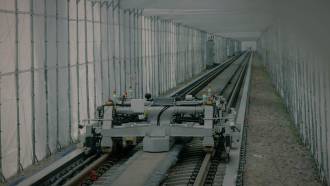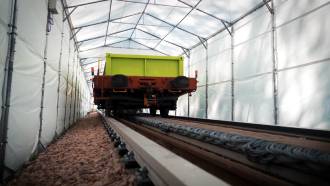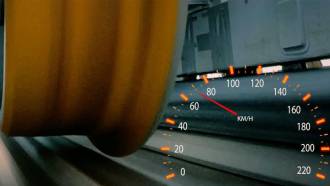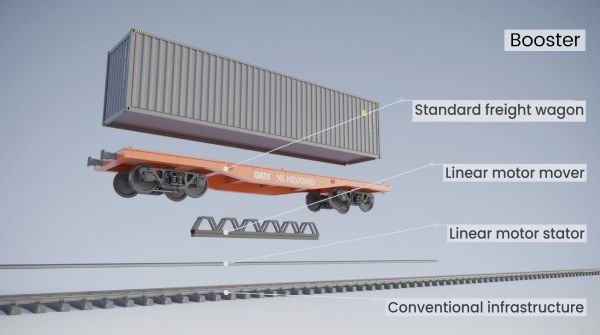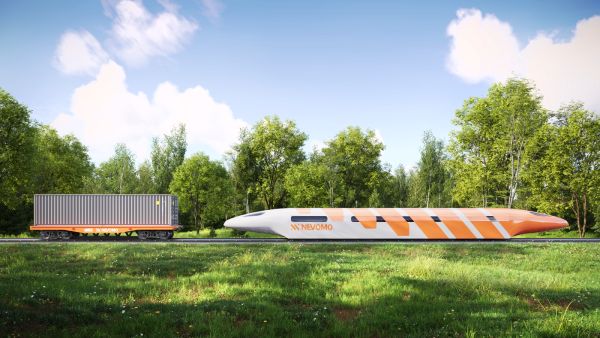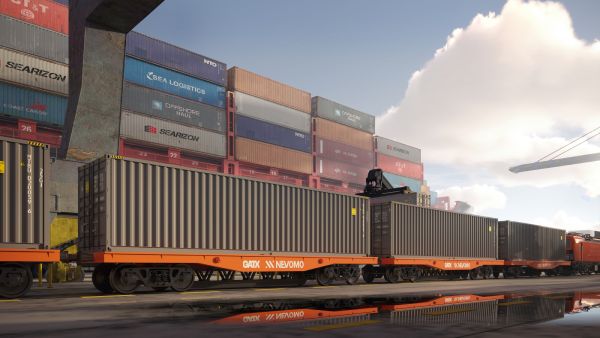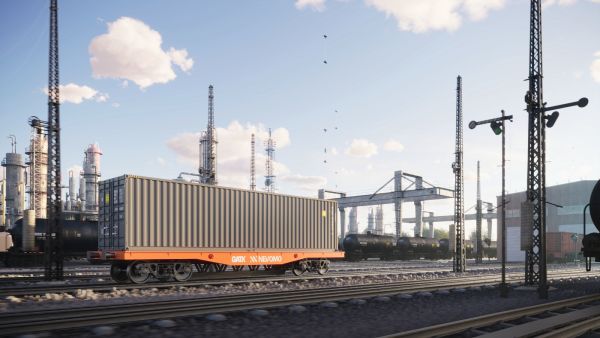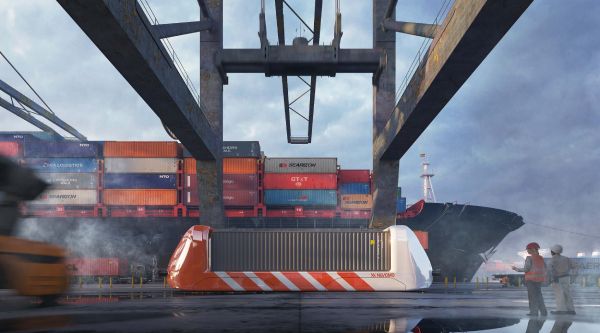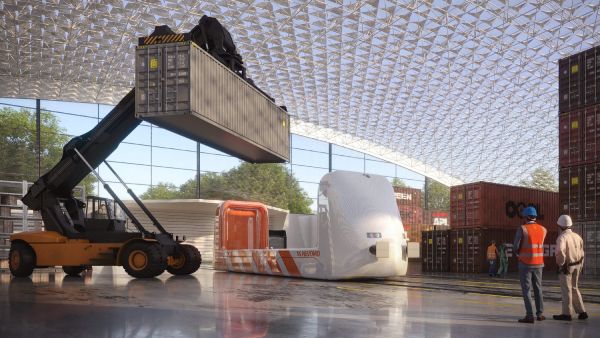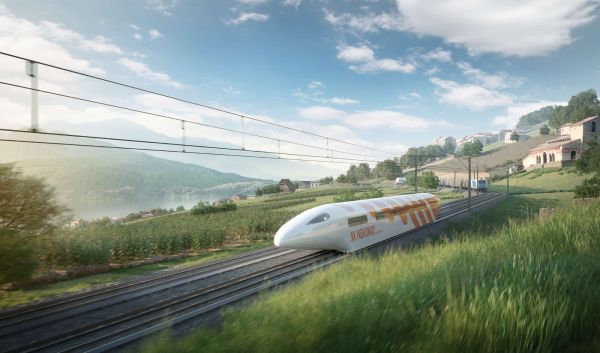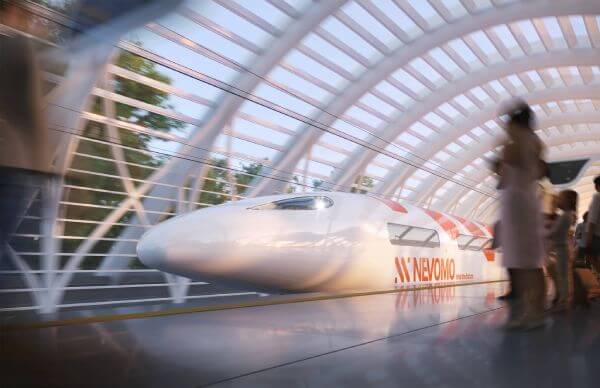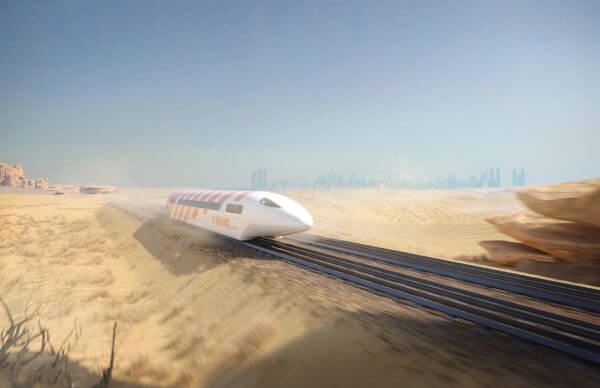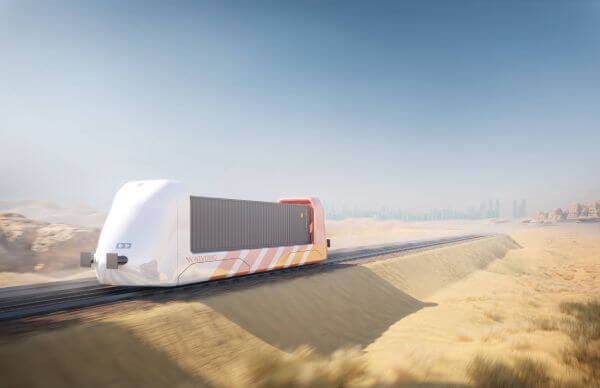-

Nevomo lässt einen Zug auf der Schiene schweben
Sept. 7, 2023Ursprünglich wollte Nevomo einen Hyperloop entwickeln. Dann hat sich das Start-up dazu entschlossen, Züge ohne Röhre schweben zu lassen.
-

Nevomo, une start-up polonaise soutenue par la SNCF, revendique des essais réussis pour son projet de train à sustentation magnétique empruntant des lignes ferroviaires existantes. Deux versions distinctes, passagers et fret, sont en développement.
-
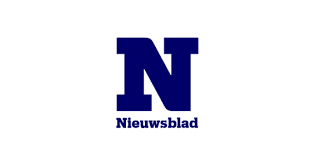
Het Poolse technologiebedrijf Nevomo heeft met succes een test uitgevoerd waarbij een spoorvoertuig zweeft op bestaande spoorinfrastructuur. Wereldwijd zijn er al enkele zogenaamde magneetzweeftreinen operationeel, maar bij dit project spoorde het testvoertuig op de klassieke, bestaande sporen.
-

Nevomo’s MagRail technology has already been highly appreciated by major players in the European railway industry, which has been confirmed by several agreements signed, including Rete Ferroviaria Italiana, duisport, and SNCF. The first 1:5 demo version of MagRail Nevomo was presented in 2019. Successful mid-size tests were conducted in December 2020. Last year, Nevomo completed the construction of the full-scale test track in Nowa Sarzyna in Poland, which is Europe’s longest track for testing passive magnetic levitation. The first tests already began and will be now extended to the MagRail Booster tests with the conventional freight wagons on MagRail infrastructure.
-

Nevomo: A different kind of magnetic railway. A sustainable magnet upgrade for rail tracks.
May 30, 2023Elon Musk’s Hyperloop was the talk of the town not so long ago, but the project has recently bogged down due to technical and financial challenges. A Polish startup called “Nevomo” sees its approach as forming a link between modern maglev trains and conventional train operations. Expanding and upgrading the existing infrastructure with “MagRail” technology and linear motors should improve the efficiency and performance of rail traffic. Opportunities abound in the area of rail freight traffic in particular...
-
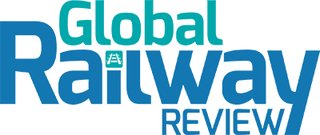
MagRail Booster technology will be installed on GATX Rail Europe supplied freight wagons and tested on rail infrastructure equipped with the system’s trackside devices.
-

GATX to test Nevomo Booster technology
May 8, 2023Nevomo and GATX Rail Europe entered into a partnership to develop MagRail Booster to innovate and significantly develop the rail freight transport. As part of the joint development of the new MagRail system capabilities, the newly introduced Booster components, being a part of the already known MagRail system, will be installed on conventional freight wagons supplied by GATX Rail Europe and then tested on rail infrastructure equipped with the system’s trackside devices.
-

NEVOMO is one of the 2023 winners of German CEO Excellence Awards at EU Business News
April 18, 2023Innovative Mobility Leader of the Year 2023 (Europe): Stefan Kirch
-
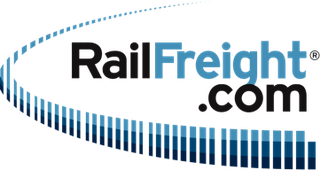
Hyperloop and rail freight: the logistics of the future
April 12, 2023The possibility of applying hyperloop and hyperloop-inspired technology to rail freight is being explored by an increasing amount of organisations. The need for faster trains and faster operations is causing the industry, especially in Europe, to collaborate with hyperloop and hyperloop-inspired projects. How do these technologies work and what can they mean for rail freight? This and more will be discussed in the upcoming RailFreight Webinar.
- March 21, 2023 - Nevomo und SNFC starten Kooperation (Bahnberufe.de)
- March 15, 2023 - Nevomo and SNCF to use MagRail to boost freight capacity in France (railfreight.com)
- March 13, 2023 - En pleine grève, la SNCF dévoile (un peu) son projet Hyperloop (Presse Citron)
- March 10, 2023 - Ultrarapide, autonome, électromagnétique... La SNCF en route vers le train du futur (Le Figaro)
- March 10, 2023 - SNCF to explore if MagRail technology can improve rail capacity (Global Railway Review)
- Feb. 10, 2023 - L’Hyperloop Association naît à Bruxelles et résonne jusqu'en Suisse (Agefi)
- Feb. 8, 2023 - Nevomo: Hyperloop Firmen gründen gemeinsam den ersten, internationalen "Hyperloop Verband" (LOK Report)
- Feb. 8, 2023 - Hyperloop companies launch international association (Global Construction Review)
- Feb. 8, 2023 - Companies join forces to launch the first international Hyperloop Association (Global Railway Review)
- Nov. 29, 2022 - Podcast: Schwebende Züge – Der Güterzug der Zukunft macht sich abfahrbereit (DVZ)
- Nov. 25, 2022 - Why develop new infrastructure for hyperloop when existing rail tracks can be used? (RailTech.com)
- Nov. 15, 2022 - Levitazione magnetica su binari normali con vista su hyperloop: arriva Nevomo, finanziata dall’UE (GreenStart)
- Nov. 2, 2022 - Hardt Hyperloop’s Polish rival Nevomo gets €5M to develop 550km/h maglev rail (TFN)
- Sept. 23, 2022 - Nevomo to develop IoT-sensoring services (Railway Pro)
- Sept. 5, 2022 - The first tests of magnetic levitation are coming soon (Railway Supply)
- Sept. 2, 2022 - MagRail test track nears completion in Poland (Rail Insider)
- June 16, 2022 - EU leads €17.5M investment in Polish Nevomo to upgrade existing rail to hyperloop tech (TFN)
- May 5, 2022 - Duisport to explore MagRail potential (Railway Pro)
- March 21, 2022 - Nevomo completes first section of EU's longest passive magnetic levitation test track (RailTech.com)
- Jan. 10, 2022 - EXPO 2020: Nevomo's tech upgrades existing railway tracks for high-speed supertrains (ITP.net)
- Oct. 5, 2021 - Track modernisation completed for magrail test facility (Railway Pro)
- Sept. 14, 2021 - Paris to Berlin in an hour: Welcome to the future of high-speed rail travel in Europe (Euronews)
- Sept. 13, 2021 - Super-fast, sustainable and accessible: Are trains the future of travel? (Euronews)
- June 21, 2021 - Feasibility of adding 550 km/h maglev services to existing railway corridors to be studied (Railway Gazette International)
- June 21, 2021 - RFI and Nevomo sign MoU to test MagRail system (International Railway Journal
- June 3, 2021 - Europe’s longest magrail test track to be constructed in Poland (New Civil Engineer)
- May 27, 2021 - Magrail technology can transform the rail system (Railway Pro)
- Feb. 9, 2021 - 10 promising Poland-based startup stars to watch in 2021 (EU-Startups)
- Jan. 29, 2021 - Is magnetic rail in Europe a stepping stone to hyperloop? (Global Railway Review)
- Jan. 25, 2021 - Nevomo to start full-scale magrail tests (Railway PRO)
- Sept. 28, 2020 - The Europeans building Musk's hyperloop vision (Sifted)
- June 19, 2020 - Future of Rail | Poland’s first step to Hyperloop high speed transport (New Civil Engineer)
- April 23, 2020 - Hyper Poland nabs €500K to develop magnetic levitation railways in Europe (EU-Startups)
- April 23, 2020 - Hyper Poland secures €500,000 to develop European magnetic rail system (Global Railway Review)
- April 2, 2020 - Meet The Founders: Hyper Poland (Crowdfunding Champions)
- March 27, 2020 - 13 IDEEN FÜR EINE BESSERE WELT (Red Bull)
- March 16, 2020 - Hyper Poland smashes funding goal in 10 days to demonstrate prototype Magrail system (Highways Today)
- March 9, 2020 - Hyper Poland achieves €451,000 investment target 10 days after launch (Global Railway Review)
- March 9, 2020 - Hyper Poland raises cash to develop magrail trains (PlaceTech)
- March 9, 2020 - 10 promising Poland-based startups to watch in 2020 (EU-Startups)
- Feb. 24, 2020 - Hyper Poland seeks funding for its new magrail technology (Railway PRO)
- Feb. 12, 2020 - HYPERLOOP IS TAKING A ‘CRUCIAL’ STEP TOWARD CONTINENT-WIDE TRAVEL (INVERSE)
- Jan. 10, 2020 - Top Polish startups to follow in 2020 (Sifted)
- Dec. 23, 2019 - Tech start-ups disrupting the rail industry in 2020 (Railway-Technology.com)
- Nov. 17, 2019 - Hyper Poland Reveals Its MagRail Transport Technology (Eco Tech Daily)
- June 4, 2019 - Hyperloop bekommt Fördermittel in Polen (PolenJournal.de)
- May 21, 2019 - Super-fast trains travelling at 600kph are on track after massive multi-million investment (The First News)
- May 15, 2019 - Warum es noch ein paar Jahre dauern wird, bis der Hyperloop marktreif ist (Der Brutkasten)
- March 12, 2019 - Polish Hyperloop among top European projects (Remix News)
- March 7, 2019 - Hyper Poland – recognized as one of the best startups in Mobility sector (Biznes Polska)
- Nov. 20, 2018 - Hyper Poland will auf modifizierten vorhandenen Bahnstrecken fahren (LOK Report)
- June 28, 2018 - Hyperloop-Standards: Branchenweit erste Arbeitsgemeinschaft initiiert (Internationales Verkehrswesen)
- June 27, 2018 - Canadian and European Hyperloop startups join hands to make hyperloop a reality soon (siliconcanals.com)
- March 16, 2018 - Startups in Poland Tackle Global Issues (euronews.com)
- Oct. 5, 2016 - With Hyperloop, travel from Dubai to Fujairah in 10 minutes (Khallej Times)
- Oct. 4, 2016 - Dubai Future Foundation Announces First-Place Winner of the International Hyperloop Competition (Government of Dubai)

